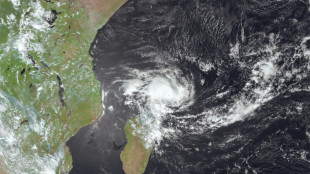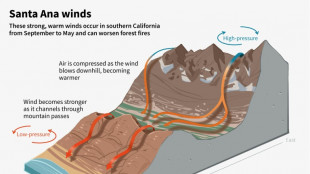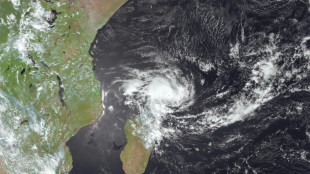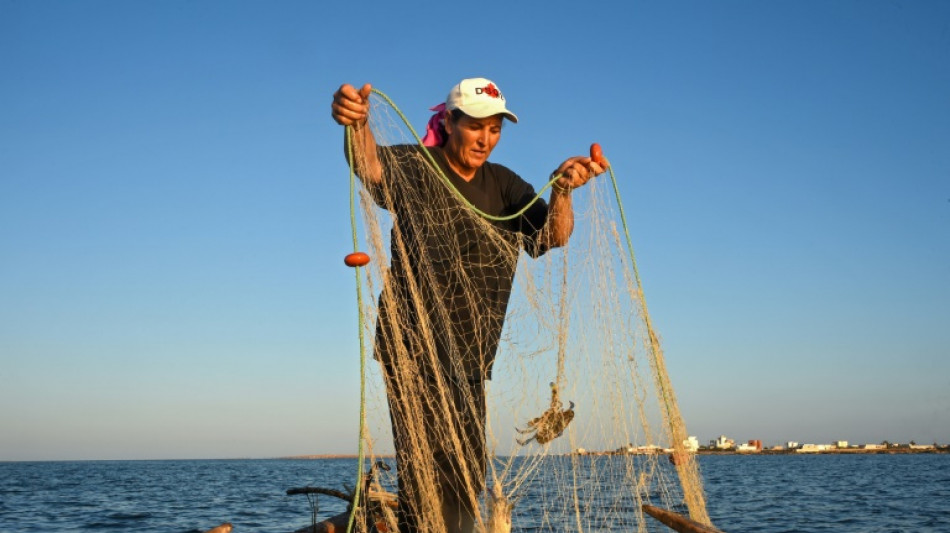
-
 Mitchell leads Cavs over Pacers, Thunder beat 76ers
Mitchell leads Cavs over Pacers, Thunder beat 76ers
-
S. Korea's Yoon: from rising star to historic arrest

-
 Ominous Alcaraz sweeps into Australian Open third round
Ominous Alcaraz sweeps into Australian Open third round
-
'Queen Wen' deposed in huge shock at Australian Open

-
 Vigilante fire clean-up launched by local Los Angeles contractor
Vigilante fire clean-up launched by local Los Angeles contractor
-
Zheng dumped out in huge shock as shaky Sabalenka battles through

-
 Asian equities mixed as US inflation, China data loom
Asian equities mixed as US inflation, China data loom
-
'Queen Wen' Zheng deposed in huge shock at Australian Open

-
 Renewed US trade war threatens China's 'lifeline'
Renewed US trade war threatens China's 'lifeline'
-
China's economy seen slowing further in 2024: AFP survey

-
 Shaky Sabalenka overcomes serve struggles to stay alive in Melbourne
Shaky Sabalenka overcomes serve struggles to stay alive in Melbourne
-
South Korea's six weeks of political chaos

-
 Japan's tourism boom prices out business travellers
Japan's tourism boom prices out business travellers
-
What is the pink stuff coating fire-ravaged Los Angeles?

-
 Mediators make final push for Gaza truce deal
Mediators make final push for Gaza truce deal
-
Musk, Bezos, Zuckerberg to attend Trump inauguration: report

-
 Federal probe begins into deadly Los Angeles fires
Federal probe begins into deadly Los Angeles fires
-
'We may look easy-going, but...' Canadians veto Trump's merger plan

-
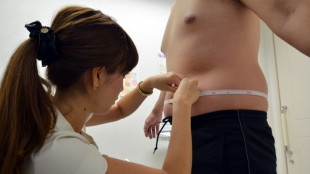 Is obesity a disease? Sometimes but not always, experts decide
Is obesity a disease? Sometimes but not always, experts decide
-
Biden issues land protections after LA fires delay ceremony

-
 Cuba to free over 550 prisoners after removal from US terror list
Cuba to free over 550 prisoners after removal from US terror list
-
Williams, Vine vie for season-opening Tour Down Under crown

-
 Maresca 'concerned' as Chelsea winless run stretches to five games
Maresca 'concerned' as Chelsea winless run stretches to five games
-
'Outstanding' Liverpool deserved more than Forest draw: Slot

-
 Guardiola laments Man City decision-making in Brentford collapse
Guardiola laments Man City decision-making in Brentford collapse
-
Marseille dumped out of French Cup on penalties

-
 Liverpool frustrated by Forest, Man City blow late lead at Brentford
Liverpool frustrated by Forest, Man City blow late lead at Brentford
-
Djokovic, Sabalenka chase history as Australian Open hits round two

-
 Golf star Woods pledges support amid 'unimaginable loss' of LA fires
Golf star Woods pledges support amid 'unimaginable loss' of LA fires
-
Liverpool held by Forest, Man City blow late lead at Brentford

-
 Cuba to free 553 prisoners after removal from US terror list
Cuba to free 553 prisoners after removal from US terror list
-
Leverkusen win to go one point behind Bayern, Kiel down Dortmund

-
 Jota rescues leaders Liverpool in Forest draw
Jota rescues leaders Liverpool in Forest draw
-
Title chasers Atalanta held by Juve, Milan hand Conceicao maiden Serie A win

-
 Man City blow late lead at Brentford, Chelsea held by Bournemouth
Man City blow late lead at Brentford, Chelsea held by Bournemouth
-
Rast charges through on second run to win Flachau slalom

-
 Grimaldo scores as Leverkusen go one point behind Bayern, Dortmund lose
Grimaldo scores as Leverkusen go one point behind Bayern, Dortmund lose
-
Starbucks shift on non-paying visitors stirs debate in US

-
 Clashes as S. Korean investigators attempt to arrest President Yoon
Clashes as S. Korean investigators attempt to arrest President Yoon
-
US, Japanese lunar landers set to launch on single rocket
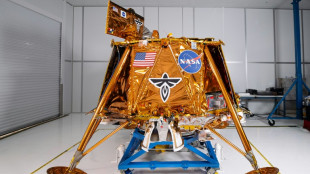
-
 Boeing 2024 plane deliveries tumble on labor, safety woes
Boeing 2024 plane deliveries tumble on labor, safety woes
-
US removes Cuba from state sponsors of terror list

-
 Argentine annual inflation nosedives, in boost for Milei
Argentine annual inflation nosedives, in boost for Milei
-
S. Korea investigators arrive in new attempt to arrest President Yoon

-
 Pressure builds on Dortmund boss Sahin after loss at Kiel
Pressure builds on Dortmund boss Sahin after loss at Kiel
-
Meta to lay off 3,600 employees in performance-based cuts

-
 Venezuela restricts diplomats from 'hostile' European countries
Venezuela restricts diplomats from 'hostile' European countries
-
Trump's Pentagon pick grilled by senators as cabinet hearings begin

-
 From ban to buyout: What next for TikTok in the US?
From ban to buyout: What next for TikTok in the US?
-
Lazio sack doc who performed far-right falconer's penis op: club owner


Tunisia fisherwomen battle inequality and climate change
Off a quiet Tunisian island, Sara Souissi readies her small fishing boat. As a woman in the male-dominated trade, she rows against entrenched patriarchy but also environmental threats to her livelihood.
Souissi began fishing as a teenager in a family of fishers off their native Kerkennah Islands near the city of Sfax, defying men who believed she had no place at sea.
"Our society didn't accept that a woman would fish," she said, hauling a catch onto her turquoise-coloured boat.
"But I persisted, because I love fishing and I love the sea," said Souissi, 43, who is married to a fisherman and is a mother of one.
A substantial portion of Tunisia is coastal or near the coast, making the sea an essential component of everyday life.
Seafood, a staple in Tunisian cuisine, is also a major export commodity for the North African country, with Italy, Spain and Malta top buyers, and revenues nearing 900 million dinars ($295 million) last year, according to official figures.
Tunisian women have long played a major role in this vital sector.
But their work has been undervalued and unsupported, a recent study by the United Nations Food and Agriculture Organization (FAO) found.
The study said that while women were actively involved throughout the fishing value chain, they remained "generally not considered as an actual worker" by their male counterparts.
Fisherwomen also have less access to administrative benefits, training and banking services, where they are viewed as "high-risk borrowers" compared to men, the study said.
As a result, many don't own their own boats, and those working with male relatives are "considered as family help and therefore not remunerated", it added
- Under the table -
In Raoued, a coastal town on the edge of the capital Tunis, the Tunisian Society for Sustainable Fishing launched a workshop in June for women's integration into the trade.
But most of the women attending the training told AFP they were only there to help male relatives.
"I want to help develop this field. Women can make fish nets," said Safa Ben Khalifa, a participant.
There are currently no official numbers for fisherwomen in Tunisia.
Although Souissi is formally registered in her trade, many Tunisian women can work only under the table -- the World Economic Forum estimates 60 percent of workers in informal sectors are women.
"We want to create additional resources amid climate change, a decrease in marine resources, and poor fishing practices," said Ryma Moussaoui, the Raoued workshop coordinator.
Last month, the Mediterranean Sea reached its highest temperature on record at a daily median of 28.9 degrees Celsius (84 Fahrenheit), Spain's leading institute of marine sciences said.
The strain on sea life and resources has been compounded in countries like Tunisia by pollution and overfishing.
Rising temperatures make the waters uninhabitable for various species, and unsustainable fishing like trawling or using plastic traps indiscriminately sweeps up the dwindling sea life and exacerbates pollution.
"They don't respect the rules," Souissi said about fishers using those methods. "They catch anything they can, even off-season."
- 'Unfavourable environment' -
In 2017 in Skhira, a port town on the Gulf of Gabes, 40 women clam collectors formed an association to enhance their income -- only to see their hard-won gains later erased by pollution.
Before its formation, the women earned about a tenth of the clams' final selling price in Europe, said its president, Houda Mansour. By cutting out "exploitative middlemen", the association helped boost their earnings, she added.
In 2020, however, the government issued a ban on clam collecting due to a severe drop in shellfish populations, leaving the women unemployed.
"They don't have diplomas and can't do other jobs," Mansour, now a baker, explained.
In hotter, polluted waters, clams struggle to build strong shells and survive. Industrial waste discharged into the Gulf of Gabes for decades has contributed to the problem.
It has also forced other species out, said Emna Benkahla, a fishing economics researcher at the University of Tunis El Manar.
"The water became an unfavourable environment for them to live and reproduce," undermining the fishers' revenue, she said.
"Because they couldn't fish anymore, some sold their boats to migrants looking to cross the Mediterranean illegally," she added, calling for more sustainable practices.
Souissi, who only uses relatively small nets with no motor on her boat, said she and others should fish responsibly in order to survive.
"Otherwise, what else can I do?" she said, rowing her boat back to shore. "Staying at home and cleaning? No, I want to keep fishing."
S.Keller--BTB


